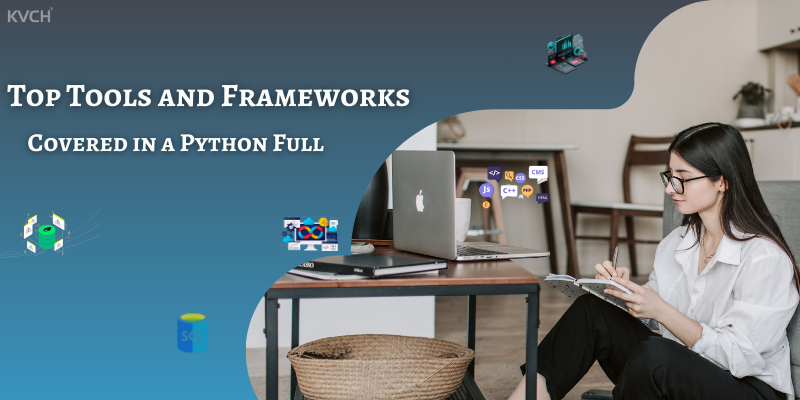Your Roadmap to Success: Python Full Stack Syllabus Essentials
- Rohit singh
- Jun 5
- 5 min read

In today’s tech-driven world, becoming a full-stack developer is a surefire way to unlock exciting career opportunities. Python, with its versatility and beginner-friendly syntax, has emerged as a top choice for aspiring developers. A well-structured Python Full Stack Syllabus can guide you through the essential skills needed to master both front-end and back-end development. Whether you're enrolling in a Python Training Institute or seeking a Python Course in Noida or a Python Institute in Delhi, understanding the syllabus is crucial for your success. This article outlines the key components of a Python full-stack syllabus, offering actionable tips to help you navigate your learning journey and build a rewarding career in tech.
Why Choose Python for Full-Stack Development?
Python’s popularity in full-stack development stems from its simplicity, extensive libraries, and robust frameworks. It’s a language that powers both front-end and back-end technologies, making it ideal for full-stack roles. A comprehensive Python Full Stack Syllabus covers front-end tools like HTML, CSS, and JavaScript, alongside back-end frameworks like Django and Flask. This dual focus ensures you can build dynamic, user-friendly applications from scratch.
Actionable Tips:
Start by mastering Python basics like variables, loops, and functions before diving into frameworks.
Explore Python’s role in web development by experimenting with small projects, such as building a personal portfolio website.
Join a Python Training Institute to gain structured guidance and hands-on experience.
Practice coding daily on platforms like LeetCode or HackerRank to solidify your skills.
Stay updated with Python’s latest libraries and tools to remain competitive in the job market.
By choosing Python, you’re equipping yourself with a versatile skill set that employers value across industries.
Core Components of a Python Full Stack Syllabus
A well-rounded Python Full Stack Syllabus is designed to transform beginners into job-ready developers. It typically includes front-end development (HTML, CSS, JavaScript), back-end development (Python with Django/Flask), database management, and version control. You’ll also learn about APIs, cloud deployment, and testing frameworks. Enrolling in a Python Course in Noida or a Python Institute in Delhi ensures you gain hands-on experience with these components through real-world projects.
Actionable Tips:
Focus on mastering HTML and CSS for responsive web design before tackling JavaScript.
Build a simple web application using Django to understand how front-end and back-end integrate.
Learn SQL for database management and practice querying databases like MySQL or PostgreSQL.
Use Git for version control and collaborate on platforms like GitHub to showcase your projects.
Regularly review your syllabus to track your progress and identify areas needing improvement.
This structured approach ensures you gain a holistic understanding of full-stack development.
Front-End Development: Building User-Friendly Interfaces
Front-end development is about creating visually appealing and interactive user interfaces. A Python Full Stack Syllabus includes HTML for structure, CSS for styling, and JavaScript for interactivity. You’ll learn frameworks like React or Bootstrap to enhance your front-end skills. These tools allow you to build responsive websites that work seamlessly across devices. A Python Training Institute often emphasizes hands-on projects, such as designing e-commerce websites or blogs, to reinforce these skills.
Actionable Tips:
Practice building responsive layouts using CSS frameworks like Bootstrap to save time.
Use JavaScript to add interactive elements like sliders or forms to your projects.
Explore Chrome DevTools to debug and optimize your front-end code.
Enroll in a Python Course in Noida to access guided front-end training with real-time feedback.
Create a portfolio of front-end projects to showcase your skills to potential employers.
Mastering front-end development ensures your applications are both functional and visually engaging.
Back-End Development: Powering Applications with Python
Back-end development focuses on the server-side logic that powers web applications. In a Python Full Stack Syllabus, you’ll dive into frameworks like Django and Flask for building robust back-ends. These frameworks simplify tasks like user authentication, data processing, and API development. A Python Institute in Delhi often includes projects like creating RESTful APIs or e-commerce back-ends to give you practical experience.
Actionable Tips:
Start with Flask for smaller projects to grasp basic back-end concepts before moving to Django.
Learn to handle HTTP requests and responses to build efficient APIs.
Practice securing your applications with authentication techniques like OAuth.
Use virtual environments to manage dependencies for your Python projects.
Regularly test your back-end code using tools like Postman to ensure functionality.
A strong back-end foundation ensures your applications are secure, scalable, and efficient.
Database Management and Integration
Database management is a critical part of full-stack development. A Python Full Stack Syllabus covers relational databases like MySQL and PostgreSQL, as well as NoSQL databases like MongoDB. You’ll learn to design schemas, write efficient queries, and integrate databases with Python frameworks. A Python Training Institute emphasizes practical exercises, such as building a database for a blog or inventory system, to solidify these skills.
Actionable Tips:
Start with SQL basics to understand queries, joins, and indexing.
Use Python’s ORM (Object-Relational Mapping) tools like Django’s ORM for easier database interactions.
Practice integrating MongoDB with Flask for handling unstructured data.
Enroll in a Python Course in Noida to work on database-driven projects under expert guidance.
Regularly back up your databases and test query performance to optimize speed.
Effective database management ensures your applications handle data efficiently and reliably.
APIs and Cloud Deployment
APIs (Application Programming Interfaces) enable communication between front-end and back-end systems. A Python Full Stack Syllabus teaches you to build and consume RESTful APIs using Django REST Framework or Flask. You’ll also learn about cloud deployment on platforms like AWS, Heroku, or Google Cloud. A Python Institute in Delhi often includes capstone projects, such as deploying a web app, to give you real-world experience.
Actionable Tips:
Build a simple API using Flask to understand endpoints and JSON responses.
Use Postman to test your APIs and ensure they return the expected data.
Deploy a small project on Heroku to learn the basics of cloud deployment.
Explore AWS free-tier services to experiment with cloud hosting.
Document your APIs clearly to make them developer-friendly and reusable.
Mastering APIs and deployment prepares you to launch professional-grade applications.
Career Opportunities and Next Steps
Completing a Python Full Stack Syllabus opens doors to roles like full-stack developer, back-end engineer, or DevOps specialist. With Python’s growing demand, graduates of a Python Course in Noida or Python Institute in Delhi can land jobs in startups, tech giants, or freelance markets. To stand out, focus on building a strong portfolio and networking with industry professionals.
Actionable Tips:
Create a GitHub portfolio showcasing projects like e-commerce sites or blogs.
Attend tech meetups or webinars hosted by Python Training Institutes to network.
Earn certifications from reputed institutes to boost your resume.
Apply for internships to gain real-world experience and industry exposure.
Continuously learn new tools like Docker or Kubernetes to stay ahead in the field.
With dedication, you can turn your Python skills into a thriving career.
Conclusion
Mastering a Python Full Stack Syllabus is your gateway to a successful career in tech. By covering front-end, back-end, databases, and deployment, it equips you with the skills to build end-to-end applications. Whether you choose a Python Course in Noida or a Python Institute in Delhi, focus on hands-on projects and consistent practice to excel. Start your journey today by enrolling in a reputable Python Training Institute, building a portfolio, and staying updated with industry trends. With Python’s versatility and demand, your roadmap to success is within reach—take the first step now!



Comments